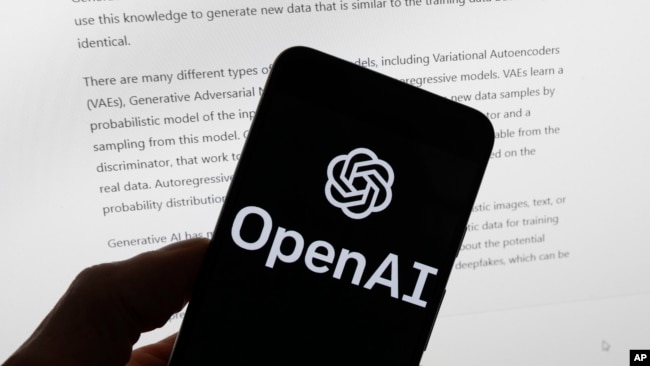AIは我々に置き換わるのか?
AI推進派からもこのような要請が出ているとは、驚きです。
懸念事項として、やはり"人間と競争する知能 "に関連する危険性を指摘しているとのことです。
「Nonhuman minds might eventutnumber, outsmart…and replace us?」
VOAで英語を学びましょう!!
マスク氏、専門家がAIの一時停止を要請、’社会へのリスク’を理由に(和訳)
Musk, Experts Urge AI Pause, Citing ‘Risks to Society’
2023 March 31
何百人もの人工知能の専門家や業界のリーダーたちが、一部のAI技術の開発中止を強く求めています。彼らは、最も強力なAI技術が人類と社会秩序に極端なリスクをもたらす可能性があると述べています。
このグループは、今週/先週、この問題についての公開書簡を発表しました。それは、人気のあるAIプログラムChatGPTの第4版が最近リリースされたことに言及したものです。
「私たちは、すべてのAI研究所に対し、ChatGPT-4よりも強力なAIシステムの訓練を少なくとも6カ月間、直ちに停止することを求めます」と、書簡は述べました。
この製品は、マイクロソフトの支援を受けた開発会社OpenAIから発売されています。人間のような議論や創造的な能力を発揮します。
「強力なAIシステムは、その効果が肯定的であり、リスクが管理可能であると確信できる場合にのみ開発されるべきです」と、書簡は続けています。
非営利団体Future of Life Instituteは、イーロン・マスクを含む約1000人のAI科学者、専門家、業界関係者の署名入り書簡を公開しました。
マスク財団は、Future of Lifeの主な資金援助者です。また、ロンドンを拠点とするグループFounders PledgeやSilicon Valley Community Foundationからも資金提供を受けています。
イーロン・マスク氏は、OpenAIの共同設立者の一人です。彼の電気自動車会社であるテスラは、自動運転システムを搭載したモデルでAIを使用しています。
マスク氏はこれまで、自動運転システムを規制する取り組みについて批判的でした。しかし今、彼は、AIの開発が公共のために役立つことを確認するための機関が作られることを望んでいます。
自動運転車のAI規制に対して ”テスラがどれほど激しく戦ってきたかを考えると、イーロン・マスク氏が署名するのは...深い偽善だ”と、ジェームズ・グリメルマン氏は言います。彼はコーネル大学のデジタル・情報法の教授です。
先月、テスラは36万2千台以上の米国車を所有者から回収しなければなりませんでした。米国の規制当局が運転支援システムが衝突を引き起こす可能性があると指摘したため、同社はソフトウェアを更新する必要がありました。当時、マスク氏は、ソフトウェア更新のための "リコール "という言葉は、"まったくもって間違いっている!"とツイートしています。
しかし、グリムメルマン氏は一時休止の考えに反対しませんでした。「一時休止は良いアイデア です」と彼は言っています。「しかし、この書簡は曖昧で、規制の問題を真剣に受け止めていません 」
書簡は、提案された休止期間中に共有の安全対策が開発される可能性を示唆しています。また、開発者に対し、政策立案者と協力してガバナンスを図るよう求めています。
書簡は、特に "人間と競争する知能 "に関連する危険性を指摘しています。
執筆者たちは、「私たちは、いずれ私たちを凌駕し、競りし...そして取って代わるかもしれない非人間的な精神を開発すべきでしょうか?」と問いかけています。そして、そのような決定は "選挙で選ばれていない技術指導者 "が行うべきものではないと言っています。
”AIのゴッドファーザー」の一人と称されるヨシュア・ベンジオ氏も署名者です。この分野の主要研究者であるスチュアート・ラッセル氏も、同様に自分の名前を書簡に入を連らねました。署名したビジネスリーダーには、Stability AI CEOのエマド・モスタク氏も含まれています。
米国の議員たちが、ChatGPTの国家安全保障や教育への影響に疑問を持ち始めたことが、今回の懸念につながっています。欧州連合の警察部隊は最近、フィッシングの試み、偽情報、犯罪に悪用される可能性について警告しました。
ゲイリー・マーカス氏は、この書簡に署名したニューヨーク大学の教授です。彼は、もっと多くのことがわかるまで、開発は遅らせるべきだと述べています。彼は”この書簡は完璧ではないが、その精神は正しい: 我々はその技術をより理解するまではスピードを落とす必要がある”と彼は言います。
昨年のリリース以来、ChatGPTはGoogleなどの他社が同様のAIシステムを作るきっかけとなりました。
スレーシュ・ヴェンカタスブラマニアン氏はブラウン大学の教授で、ホワイトハウスの科学技術政策室の元アシスタントディレクターです。
彼は、これらのシステムを作るための多くの力は、通常、いくつかの大企業の手にあると述べています。
「このようなモデルはそういうもので、構築するのも民主化するのも難しいのです。」
Musk, Experts Urge AI Pause, Citing ‘Risks to Society’
Hundreds of artificial intelligence experts and industry leaders are urging for a suspension in development of some AI technology. They say that the most powerful AI technology could present extreme risks to humanity and social order.
The group released an open letter about the issue this/last week. It referenced the recent release of a fourth version of the popular AI program ChatGPT.
“We call on all AI labs to immediately pause for at least 6 months the training of AI systems more powerful than" ChatGPT-4,” the letter says.
The product comes from Microsoft-backed developer OpenAI. It performs human-like discussions and creative abilities.
"Powerful AI systems should be developed only once we are confident that their effects will be positive and their risks will be manageable," the letter continues.
The non-profit group Future of Life Institute released the letter signed by about a thousand AI scientists, experts and industry members, including Elon Musk.
The Musk Foundation is the main financial backer of Future of Life. It also receives money from the London-based group Founders Pledge, and Silicon Valley Community Foundation.
Elon Musk is one of the co-founders of OpenAI. His electric car company, Tesla, uses AI in models with self-driving systems.
Musk has been critical about efforts to regulate the self-driving system. But, now, he is hoping an agency is created to make sure the development of AI serves the public.
"It is ... deeply hypocritical for Elon Musk to sign on given how hard Tesla has fought against” AI regulation in his self-driving cars, said James Grimmelmann. He is a professor of digital and information law at Cornell University.
Last month, Tesla had to recall from owners more than 362,000 of its U.S. vehicles. The company had to update software after U.S. regulators said the driver assistance system could cause crashes. At the time, Musk tweeted that the word "recall" for a software update is "just flat wrong!"
However, Grimmelmann did not disagree with the idea of a temporary break. "A pause is a good idea,” he said, “but the letter is vague and doesn't take the regulatory problems seriously."
The letter suggests shared safety measures could be developed during the proposed suspension. It also calls on developers to work with policymakers on governance.
The letter noted danger linked especially to “human-competitive intelligence.”
The writers ask, “Should we develop nonhuman minds that might eventually outnumber, outsmart…and replace us?" They also say that such decisions should not be made by “unelected tech leaders."
Yoshua Bengio, often described as one of the "godfathers of AI," was also a signer. Stuart Russell, a lead researcher in the field, put his name on the letter as well. Business leaders who signed include Stability AI CEO Emad Mostaque.
The concerns come as U.S. lawmakers begin to question ChatGPT’s effect on national security and education. The European Union police force warned recently about the possible misuse of the system in phishing attempts, disinformation and crime.
Gary Marcus is a professor at New York University who signed the letter. He said development should slow until more is learned. "The letter isn't perfect, but the spirit is right: we need to slow down until we better understand” the technology, he said.
Since its release last year, ChatGPT has led other companies like Google to create similar AI systems.
Suresh Venkatasubramanian is a professor at Brown University and former assistant director in the White House Office of Science and Technology Policy.
He said that a lot of the power to create these systems is usually in the hands of a few large companies.
"That's how these models are, they're hard to build and they're hard to democratize."
Words in This Story
confident — adj. having a feeling or belief that you can do something well or succeed at something
positive — adj. good or useful
regulate — v. to make rules or laws that control
hypocritical — adj. a person who claims or pretends to have certain beliefs about what is right but who behaves in a way that disagrees with those beliefs
vague — adj. not clear in meaning
recall — v. to remember from the past
phishing — n. the practice of sending emails pretending to be from real companies in order to get individuals to reveal personal information
